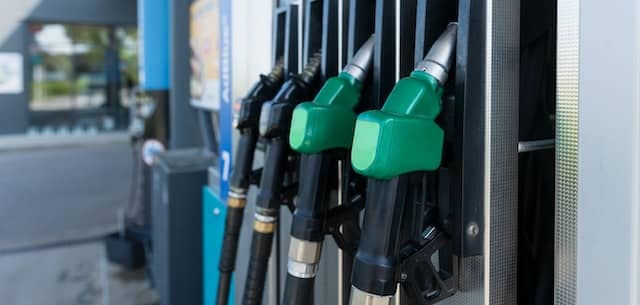
Why does my car smell like gas? Well, the presence of a gasoline odor in a vehicle is not uncommon; however, a strong or persistent smell may signal more serious underlying problems that need to be addressed to maintain the safety and performance of your car.
A gas smell in your car not only creates an unpleasant environment but can also pose a potential danger. Failure to address the issue may result in fuel leaks, fires, or engine damage. Moreover, it can have a negative impact on your car’s fuel efficiency and overall performance. Identifying and rectifying the root cause of the smell is crucial for ensuring the safety and longevity of your vehicle.
There are several factors that can contribute to a gas smell in your car, such as fuel leaks, malfunctioning fuel system components, engine issues, or external factors like spilled gasoline during refueling. In the subsequent sections, we will examine each of these causes in detail and provide guidance on how to identify and resolve them.
Possible Causes Of Gas Smell In Your Car
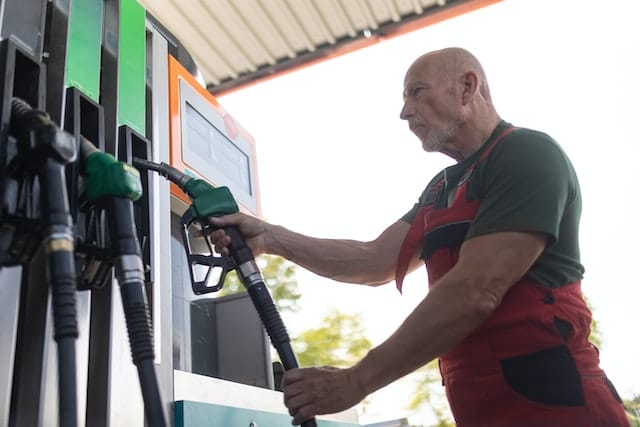
Fuel Leaks
Fuel line leaks
Damaged or deteriorated fuel lines can cause gasoline to leak and produce a noticeable smell. Fuel line leaks are often the result of corrosion, wear and tear, or damage from road debris.
Fuel injector leaks
A leaking fuel injector can cause gasoline to escape and create a strong gas odor. This can be due to faulty seals, cracked injectors, or loose connections.
Gas tank leaks
A damaged gas tank can lead to gasoline leakage, which results in a gas smell. Common causes of gas tank leaks include corrosion, punctures, or improper sealing.
Fuel filler neck leaks
The fuel filler neck, which connects the gas tank to the fuel cap, can develop leaks due to rust, wear, or damage, allowing gasoline vapors to escape and cause a smell.
Malfunctioning fuel system components
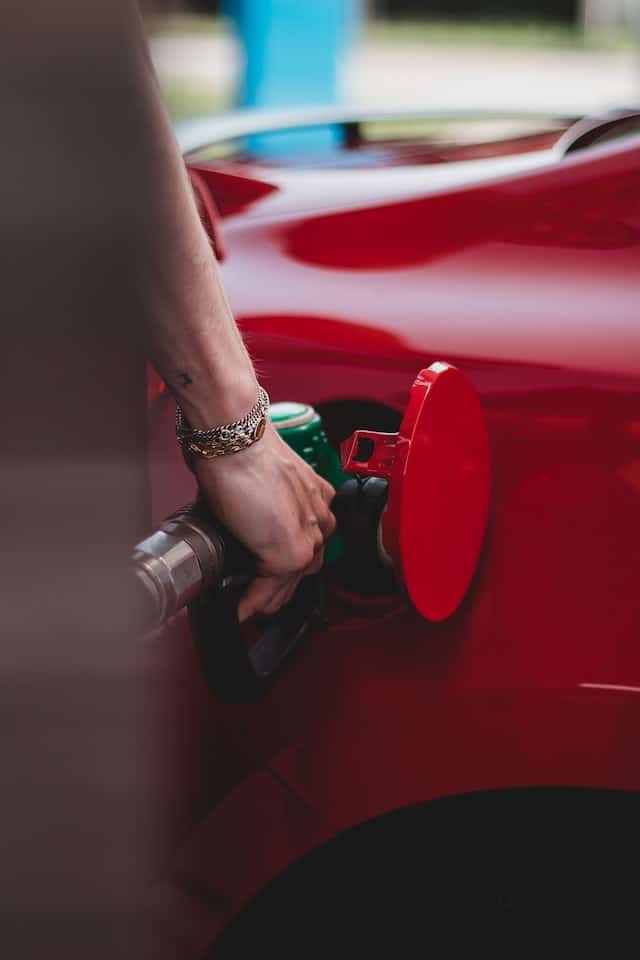
Faulty fuel pressure regulator
A failing fuel pressure regulator may cause excess gasoline to enter the engine, leading to a rich fuel mixture and a noticeable gas odor.
Damaged fuel cap or gasket
A damaged or improperly sealed fuel cap can allow gasoline vapors to escape, resulting in a gas smell. This can be caused by a worn-out gasket or a broken fuel cap.
Malfunctioning EVAP system
The Evaporative Emission Control System (EVAP) is responsible for containing and recycling fuel vapors. A malfunctioning EVAP system, such as a faulty purge valve or vent valve, can lead to a gas smell inside or outside the car.
Engine problems
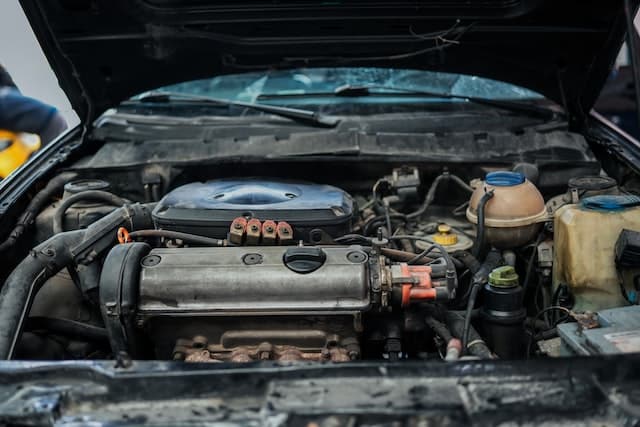
Rich fuel mixture
An overly rich fuel mixture, caused by issues such as a malfunctioning oxygen sensor or a clogged air filter, can result in unburned gasoline in the exhaust, producing a gas smell.
Leaking intake manifold gasket
A damaged or worn intake manifold gasket can cause gasoline to leak into the engine, creating a gas smell in the engine compartment.
Damaged or worn piston rings
Worn or damaged piston rings can lead to gasoline and oil mixing in the combustion chamber, causing a gas smell in the exhaust.
Loose or Damaged Spark Plugs
When experiencing a gas smell in your car, spark plugs may not be the first component you consider. Nonetheless, if they are not securely tightened, their sealing rings can allow combustion chamber fumes to escape. These fumes can then enter your vehicle via the air intake of the ventilation system. Additionally, spark plugs come equipped with washers that help maintain a tight seal.
External factors
Spilled gasoline during refueling
Accidental spills or overfilling the gas tank during refueling can cause gasoline to evaporate and create a gas smell around your vehicle.
Gas station or nearby source of gas smell
Sometimes, the gas smell may not originate from your car but rather from a nearby gas station, fuel truck, or another vehicle with a fuel leak.
Identifying the Cause of the Gas Smell
Visual inspection
Fuel lines and connections
Check for any visible signs of damage, wear, or leakage along the fuel lines and connections, paying close attention to areas where lines connect to other components.
Gas tank and filler neck
Inspect the gas tank and filler neck for signs of damage, rust, or leaks, and ensure that the fuel cap is properly sealed and in good condition.
Engine compartment
Look for any signs of gasoline leaks or wet spots in the engine compartment, paying close attention to the fuel injectors, intake manifold, and other fuel system components.
Using your sense of smell
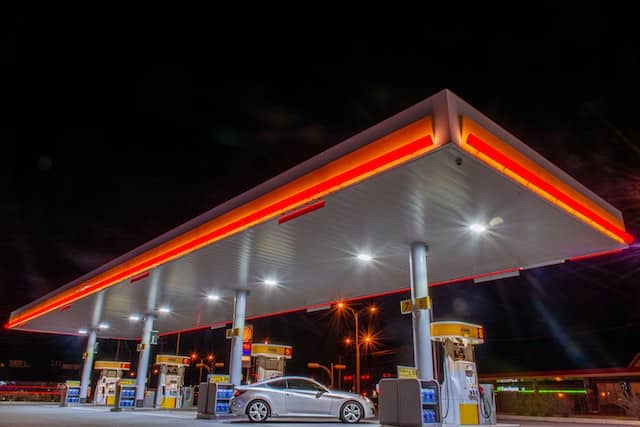
Location of the smell (inside vs. outside the car)
Determine whether the gas smell is more prominent inside or outside the vehicle, as this can help narrow down the potential causes.
Intensity and persistence of the smell
Take note of how strong the gas smell is and whether it dissipates quickly or lingers, as this can provide clues about the severity and location of the issue.
Checking for warning signs on the dashboard
Look for any warning lights or messages on the dashboard that may indicate a problem with the fuel system, such as the check engine light or an EVAP system warning.
Consulting a professional mechanic
If you are unable to identify the cause of the gas smell or if you are unsure about how to proceed, consult a professional mechanic for a thorough inspection and diagnosis. They can use specialized tools and equipment to accurately pinpoint the issue and recommend appropriate repairs or replacements.
Addressing the Gas Smell in Your Car

Why Does My Car Smell Like gas? Immediate actions to take
Ensuring proper ventilation
Open the windows or doors to allow fresh air into the car, helping to dissipate the gas smell and reduce the risk of inhaling harmful fumes.
Turning off the engine and avoiding open flames
If you suspect a fuel leak or another serious issue, turn off the engine immediately and avoid smoking or using open flames near the vehicle to prevent fires or explosions.
Seeking professional help if necessary
If you cannot identify the cause of the gas smell or if you suspect a serious issue, contact a professional mechanic or roadside assistance for help.
Long-term solutions
Regular maintenance and inspections
Schedule routine maintenance and inspections for your vehicle to ensure that all fuel system components are in good working condition and to detect potential issues before they become more serious.
Replacing faulty components
Replace any damaged, worn, or malfunctioning fuel system components as needed to prevent gas smells and maintain optimal performance.
Adopting safe refueling practices
When refueling your vehicle, avoid overfilling the gas tank and ensure the fuel cap is properly tightened to prevent spills and evaporative emissions. Be mindful of your surroundings and clean up any accidental spills promptly.
Is It Safe to Drive a Car that Smells like Gas?
It is generally not safe to drive a car that smells like gas. A strong gas smell could indicate a fuel leak, a malfunctioning fuel system component, or an engine problem, which can lead to hazardous situations such as fires, explosions, or engine damage. Additionally, inhaling gasoline fumes can be harmful to your health.
If you notice a gas smell in your car, it is essential to address the issue promptly. Turn off the engine, ensure proper ventilation, and avoid smoking or using open flames near the vehicle. If you cannot identify the cause of the gas smell or if you suspect a serious issue, contact a professional mechanic or roadside assistance for help. It is always better to prioritize safety and have the issue diagnosed and resolved before continuing to drive the vehicle.
